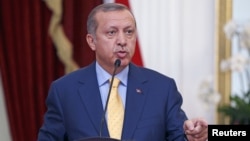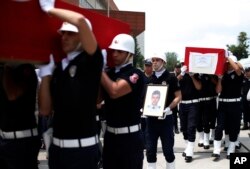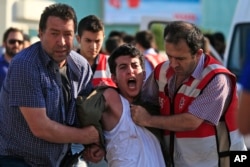Turkey’s President Recep Tayyip Erdoğan has signaled the possibility of an early parliamentary election. His comments come as talks about forming a coalition government drag on in Ankara.
His supporters, meanwhile, are calling for the main pro-Kurdish opposition party, whose electoral performance last month denied the ruling party a majority, to be banned, accusing it of being a stalking horse for terrorists.
Erdoğan raised the possibility of a snap election in remarks to reporters while heading to Indonesia, noting that Turkey will need to return to the polls if ongoing government coalition talks fail.
He also made clear his own dislike of coalitions, pointing out that they tend to be short-lived and that Turkey, as it pursues a two-front war against Islamic State militants and Kurdish separatists, needs a strong government.
“For more than 20 years, the [average] longest lifetime for coalition governments has been three or four months,” he said.
Erdoğan’s Prime Minister, Ahmet Davutoğlu, has been conducting negotiations with the two main opposition parties, but the talks appear to be stuck. Commentators and opposition politicians are accusing the Turkish leader of pursuing a strategy geared to obstruct the formation of a coalition government.
The president’s office denies the charge.
Pro-Kurdish party
The small pro-Kurdish People’s Democratic Party (HDP) has been loudest in making those claims, accusing Erdoğan of trying to shape the electoral circumstances that would allow his Justice and Development Party (AKP) to form a single-party government once again.
HDP leaders met midweek with a series of foreign ambassadors in Ankara — on Thursday with U.S. ambassador John Bass and Friday with European Union ambassadors — to brief them on rising tensions between the AKP and HDP.
AKP lawmakers accuse the party of having links with the outlawed Kurdistan Workers’ Party (PKK), whose bases and training camps in northern Iraq and Turkey have come under a series of Turkish airstrikes with 30 F-16 bombings on Thursday alone.
Among the issues raised with the ambassadors are moves in parliament to lift immunity protections on two HDP co-chairs, Selahattin Demirtaş and Figen Yüksekdağ, paving the way for them to be prosecuted, according to party officials.
State prosecutors are investigating both for “terrorism propaganda,” which could result in 24-year prison sentences.
On social media forums, AKP supporters and Twitter trolls have been urging the HDP be banned. Its leaders say it's part of a coordinated campaign of intimidation against the pro-Kurdish party.
Speaking to the media Friday, Demirtaş urged the government to cease bombing PKK bases and to renew peace talks with the separatists.
Kurdish separatists
For the last three years, the Kurdish separatist group and Ankara have been negotiating for a resolution to the PKK’s three-decades-long insurgency, but talks are now off following this week’s military clashes and Turkish airstrikes.
Turkish defense officials say at least 190 militants have been killed in the airstrikes and more than 300 wounded. The PKK has responded with the shootings and attacks that have killed a dozen members of the security forces and one civilian.
“The peace process should be restarted although it has been going very slowly … dialogue is not something humiliating,” said Demirtaş.
He added: “As the people of Turkey, we should say, ‘Remove your hands from the trigger, solve this issue at the table.’”
Earlier this week President Erdoğan appeared to slam the door on resuming talks, saying, “It is not possible for us to continue the peace process with those who threaten our national unity and brotherhood.”
“Executives of this party (HDP) should pay,” he added, prompting Kurdish fears the government may act on the demands of its supporters and move more broadly against the HDP, or possibly ban it.
Damaging the HDP
Merve Tahiroglu, an analyst with the Washington-based Foundation for the Defense of Democracies, said he thinks it unlikely the AKP government would take such a drastic move, arguing the ruling party’s leadership has in the past adopted a strong stance against banning political parties.
“Because most of its leadership comes from parties that were banned,” she said. “The goal is to damage the HDP’s image by identifying it with the PKK. The endgame for Erdoğan is early elections and to regain the conservative Kurdish votes the AKP lost to the HDP in June — and also to diminish the HDP’s appeal among liberal Turkish voters.”
Demirtaş, a former human rights lawyer, led the HDP into the parliamentary elections. Campaigning on a progressive agenda, the HDP broadened its appeal beyond traditional Kurdish supporters, winning enough seats to deprive the AKP of a parliamentary majority for the first time in more than a decade.
Turkish government leaders have maintained a drum beat all week against the pro-Kurdish party. In China, Erdoğan told reporters traveling with him that Demirtaş “can't take a stand against the PKK, which is recognized as a terrorist organization by Europe and the United States.”
He also raised the issue that the HDP leader’s brother, Nurettin, was imprisoned in the past for fighting alongside Kurdish separatists in the mountains of Iraq.
Airstrikes to continue
Speaking Friday, Davutoğlu said violence would abate in Turkey when all armed groups quit the country, vowing to continue security operations against both Islamic extremists and Kurdish militants.
“These operations will continue until armed groups leave the country and lay down their arms, and until the Islamic State of Iraq and the Levant ceases to be a threat,” he said, addressing a counter-terrorism conference.
He dismissed opposition allegations that the abrupt launching of attacks on IS and the PKK are linked to domestic politics or electoral calculations. He said the government was responding to last week’s jihadist bombing in the southern Turkish town of Suruc and a spike in PKK violence.
“If we hesitated in case of such an attack, if we had played time, saying, ‘Wait and see because we are … charged with forming a government,’ be assured that Turkey would have been dragged into chaos by now,” said Davutoğlu.






